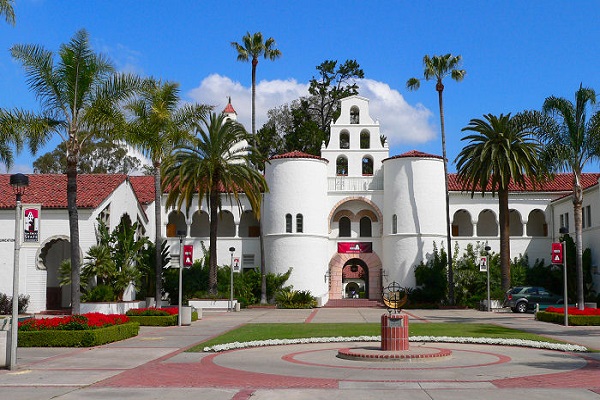San Diego State University and National City schools partnership connects science and the arts towards sustainability
On May 19, sixth graders from National City and their families gathered at San Diego State University to celebrate the release of their hip-hop album EARTH-Hop. They had spent the past semester working with student mentors from SDSU to write lyrics, compose and record songs, and create artwork for the album that tackled themes of climate change and sustainability.
EARTH-Hop, short for Environmental Action & Response Team Hip-Hop, was the the brainchild of Barbara Macz, a graduate of the master’s program in global composition in the School of Music and Dance, born out of her own frustration — as someone with ADHD — with learning science.
She thought that perhaps combining science with the arts could make it more accessible.
“Incorporating music into learning difficult concepts is just more fun, I think, than children listening to someone talk about science for an hour and then writing a report on it,” said Macz.
Macz approached Eric Smigel, professor of music, a member of SDSU’s Community Climate Action Network (CCAN), which partners with under-resourced communities to create a more resilient and sustainable future.
Smigel, along with fellow CCAN member Jessica Barlow, executive director of the Center for Regional Sustainability, thought EARTH-Hop would be a perfect fit for CCAN, which prioritizes and centers community engagement.
“The point of the CCAN project is community input into understanding how to develop climate action policies,” said Vice President for Research and Innovation Hala Madanat, who addressed the students and their families at the album release celebration. “And one of the ways by which you do it is creative expression: translating the world of science and engineering and health into everyday life that people can relate to.”
CCAN was launched in 2021 and is part of President Adela de la Torre’s Big Ideas Initiative. The initiative supports transdisciplinary collaborations to create transformational solutions to the greatest challenges facing our world.
Community partners
National City has a long history of community partnerships with SDSU, and the superintendent of National School District, Leighangela Brady, quickly got on board with the EARTH-Hop project.
“I think that creativity comes in many different forms, and when you take the creative side of art and music and you intersect it with science, technology, engineering, and math, that’s where you are going to see a brand new type of innovation,” she said.
The sixth graders who participated were members of Brady’s year-long student round table, which was already working on a campaign around the U.N.’s sustainable development goals, serving as ambassadors between the district and their community.
The SDSU student mentors — who included music, creative writing and sustainability majors, among others — held monthly workshops with the sixth graders. They started by researching climate science and action, and things they could do to improve their own community and create more sustainable ecosystems. Building on this foundation, they designed an ideal city with the U.N. sustainability goals in mind, considering equitable access to things like green space, clean air and housing. They took key takeaways from that session to create word art, brainstorming ideas to include in poems about their chosen topic — be it water conservation, saving rhinos, or protecting coral reefs. Their poems served as the basis for song lyrics.
“With my creative writing skills, I’m helping them write lyrics and put it on the page and get their voices out there,” said mentor Robert Lang, an MFA student in the creative writing program.
The student mentors then taught the sixth graders how to use Garageband to put those lyrics to music, after which they recorded tracks for their albums. They also designed and illustrated album covers to go with their songs.
Brady said over the course of the EARTH-Hop project, the sixth graders spread ideas about climate change action throughout National City.
“They are going back to their classrooms and talking about it with their fellow students, their teachers, their principals,” she said. “And they’re going home and they’re talking about it with their parents, their siblings, their aunts and uncles.”
The EARTH-Hop album will also reach a global audience, streaming worldwide on SoundCloud and other major platforms.
“Ultimately, this project invites everyone who creates or experiences the album to contribute to the dialogue about climate action taking place in their own communities,” said Smigel.

